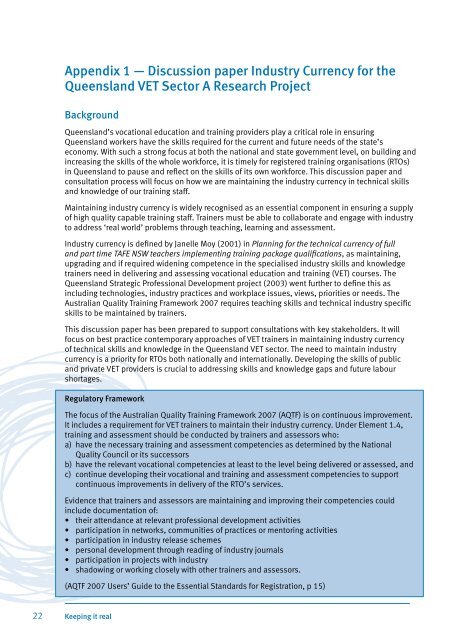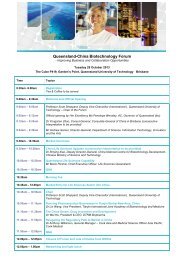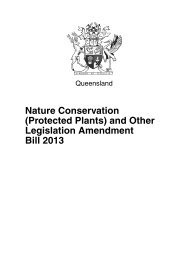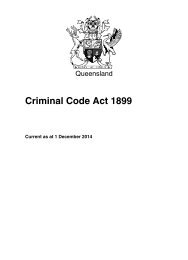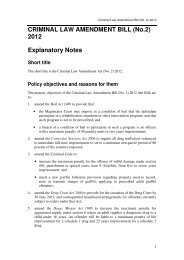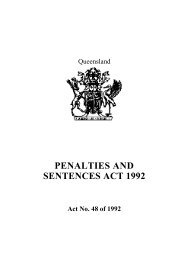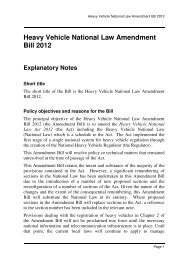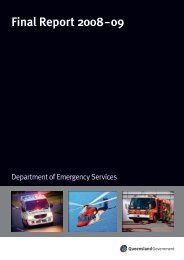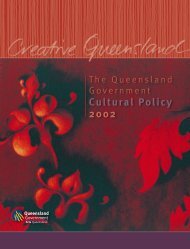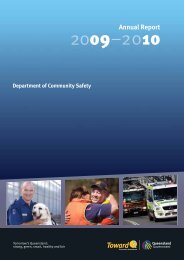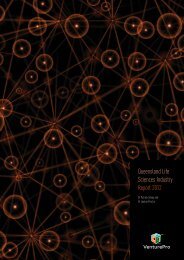Keeping it real - the Queensland VET Development Centre
Keeping it real - the Queensland VET Development Centre
Keeping it real - the Queensland VET Development Centre
- No tags were found...
Create successful ePaper yourself
Turn your PDF publications into a flip-book with our unique Google optimized e-Paper software.
Appendix 1 — Discussion paper Industry Currency for <strong>the</strong><strong>Queensland</strong> <strong>VET</strong> Sector A Research ProjectBackground<strong>Queensland</strong>’s vocational education and training providers play a cr<strong>it</strong>ical role in ensuring<strong>Queensland</strong> workers have <strong>the</strong> skills required for <strong>the</strong> current and future needs of <strong>the</strong> state’seconomy. W<strong>it</strong>h such a strong focus at both <strong>the</strong> national and state government level, on building andincreasing <strong>the</strong> skills of <strong>the</strong> whole workforce, <strong>it</strong> is timely for registered training organisations (RTOs)in <strong>Queensland</strong> to pause and reflect on <strong>the</strong> skills of <strong>it</strong>s own workforce. This discussion paper andconsultation process will focus on how we are maintaining <strong>the</strong> industry currency in technical skillsand knowledge of our training staff.Maintaining industry currency is widely recognised as an essential component in ensuring a supplyof high qual<strong>it</strong>y capable training staff. Trainers must be able to collaborate and engage w<strong>it</strong>h industryto address ‘<strong>real</strong> world’ problems through teaching, learning and assessment.Industry currency is defined by Janelle Moy (2001) in Planning for <strong>the</strong> technical currency of fulland part time TAFE NSW teachers implementing training package qualifications, as maintaining,upgrading and if required widening competence in <strong>the</strong> specialised industry skills and knowledgetrainers need in delivering and assessing vocational education and training (<strong>VET</strong>) courses. The<strong>Queensland</strong> Strategic Professional <strong>Development</strong> project (2003) went fur<strong>the</strong>r to define this asincluding technologies, industry practices and workplace issues, views, prior<strong>it</strong>ies or needs. TheAustralian Qual<strong>it</strong>y Training Framework 2007 requires teaching skills and technical industry specificskills to be maintained by trainers.This discussion paper has been prepared to support consultations w<strong>it</strong>h key stakeholders. It willfocus on best practice contemporary approaches of <strong>VET</strong> trainers in maintaining industry currencyof technical skills and knowledge in <strong>the</strong> <strong>Queensland</strong> <strong>VET</strong> sector. The need to maintain industrycurrency is a prior<strong>it</strong>y for RTOs both nationally and internationally. Developing <strong>the</strong> skills of publicand private <strong>VET</strong> providers is crucial to addressing skills and knowledge gaps and future labourshortages.Regulatory FrameworkThe focus of <strong>the</strong> Australian Qual<strong>it</strong>y Training Framework 2007 (AQTF) is on continuous improvement.It includes a requirement for <strong>VET</strong> trainers to maintain <strong>the</strong>ir industry currency. Under Element 1.4,training and assessment should be conducted by trainers and assessors who:a) have <strong>the</strong> necessary training and assessment competencies as determined by <strong>the</strong> NationalQual<strong>it</strong>y Council or <strong>it</strong>s successorsb) have <strong>the</strong> relevant vocational competencies at least to <strong>the</strong> level being delivered or assessed, andc) continue developing <strong>the</strong>ir vocational and training and assessment competencies to supportcontinuous improvements in delivery of <strong>the</strong> RTO’s services.Evidence that trainers and assessors are maintaining and improving <strong>the</strong>ir competencies couldinclude documentation of:• <strong>the</strong>ir attendance at relevant professional development activ<strong>it</strong>ies• participation in networks, commun<strong>it</strong>ies of practices or mentoring activ<strong>it</strong>ies• participation in industry release schemes• personal development through reading of industry journals• participation in projects w<strong>it</strong>h industry• shadowing or working closely w<strong>it</strong>h o<strong>the</strong>r trainers and assessors.(AQTF 2007 Users’ Guide to <strong>the</strong> Essential Standards for Registration, p 15)22 <strong>Keeping</strong> <strong>it</strong> <strong>real</strong>


